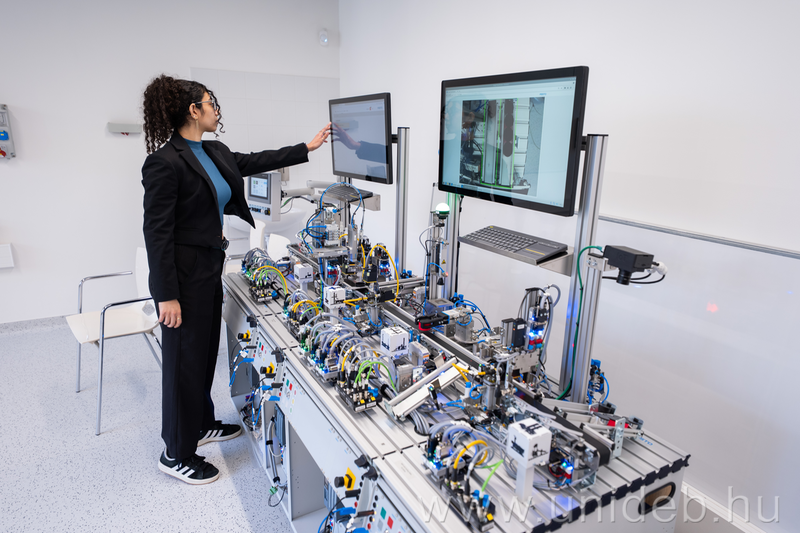The University of Debrecen’s Faculty of Engineering building complex at the Ótemető street campus has expanded by over 3,200 square meters. The new two-story facility houses primarily educational units, laboratories, student community spaces, and offices. Balázs Hankó, the Minister of Culture and Innovation, referred to the University of Debrecen as an outstanding example of the renewed Hungarian higher education during the formal opening ceremony on Friday.
The infrastructure development was mainly driven by the continuous growth in student numbers at the Faculty of Engineering: when the educational program expansion started in 2006, the university had 2,000 students, and now it has more than 3,000. The investment aims to provide the University of Debrecen with the highest level of infrastructure to support both the practical and theoretical aspects of engineering education, aligning with the city’s significant role in the automotive industry.
György Kossa, the Chairman of the Board of the Gróf Tisza István Debreceni Egyetemért Foundation, which oversees the University of Debrecen, stated that the Faculty of Engineering is celebrating its 60th anniversary this year, during which it has played a significant role in the industrial development of the country by training engineering generations.
“The University of Debrecen has always considered the continuous advancement of development, improving the quality of education, supporting research and development, and strengthening the region’s economy and society as a priority. The inauguration of the new and renewed building of the Faculty of Engineering marks a new milestone in this mission. This building is not just made of bricks and concrete. This is the house of knowledge, where generations of engineers are being prepared to shape the world,” Kossa György emphasized.
According to the Chairman, this center creates an opportunity for young people in the region to acquire the most modern technologies and the foundations of future industries in a modern 21st-century environment. As a result, the Faculty of Engineering not only strengthens student training but also enhances the competitiveness of the Hungarian economy.
“Thanks to this investment, the faculty has become one of the country’s most significant engineering training centers. The numbers speak for themselves: while the national employment rate of engineering graduates is 87%, at the University of Debrecen’s Faculty of Engineering, this rate is 93%, with many graduates securing leadership positions at domestic or international companies,” Kossa said.
Zoltán Bács, Chancellor of the University of Debrecen, reported that the investment, worth 4 billion forints, is part of a massive 29.5 billion forint development program called the Debrecen Automotive Industry Center. Elements of this program include the ongoing modernization and expansion of the Faculty of Engineering’s Ótemető street campus in four phases, the construction of the Vehicle Laboratory at the Vezér street industrial park, and the renovation of the Chemical Building at the University Square campus.
“The industrial development in Debrecen, including the arrival of the BMW car factory, requires the education system to keep up with the needs of these companies. A process has begun, in which the city and industrial players are strengthening their ties, and the university will conduct social and societal research in the coming years to determine the direction of development in these areas,” Bács Zoltán stated.
The Chancellor thanked the companies that helped equip the 10 laboratories in the new building and are participating in the education at the faculty. He also praised the cooperation in Debrecen between the local government, state leadership, the university, industrial players, and social actors.
Zoltán Szilvássy, Rector of the University of Debrecen, recalled that after the 2013 opening ceremony, it was clear that something very special was beginning in the Aulá of this building.
“We envisioned that the Faculty of Engineering would embark on a rapid development path, reaching an international level like the Faculty of Science, the Faculty of Arts, the Faculty of Architecture, or the Faculty of Medicine. That is exactly what has happened. Today, the Faculty of Engineering has excellent instruments and technologies, and its trained students and faculty members are achieving outstanding results in international competitions. For example, our students have been among the top three in nuclear energy for years. The faculty has a very high reputation,” said Rector Szilvássy.
According to Szilvássy, the key to success is the collaboration between Debrecen, the university, and industrial companies.
“Economic activity without culture would simply be profit maximization, but together with culture, it creates something wonderful. The alliance between BMW, the university, and the city is supported by intercontinental collaborations, as the Debrecen Automotive Cluster Association has members from China, Germany, and Hungary,” added the rector.
László Papp, Mayor of Debrecen, spoke about how the city, despite all challenges, is able to seize opportunities, work, and grow. Today, the new part of the Faculty of Engineering symbolizes this effort.
“This impressive new building excellently represents our city’s modern development strategy. Education must go hand in hand with the economy,” explained the mayor.
He emphasized that while 72,000 students were enrolled in Debrecen’s educational institutions, from kindergarten to university, in 2015, today the number exceeds 82,000.
“Within the walls of this new building, the synthesis of the government, the city of Debrecen, the University of Debrecen, local companies, and the needs of students is clearly visible. Large companies are cooperating with the Faculty of Engineering, creating specialized classrooms equipped with the latest tools, and more and more domestic and international students are choosing this institution. Meanwhile, the city and the government are working to ensure that many graduates envision their future here. Without the university’s training programs, we would not be able to meet the labor demands of the industry. Without state support, this high-quality educational facility would not have been possible,” stated Papp László.
Minister Balázs Hankó highlighted that Hungarian higher education has been renewed and is successful, with the University of Debrecen being one of the prominent examples. He revealed that one key to success is that universities should be locally managed, with decisions on education, research, and economic cooperation being made locally rather than in Budapest.
“Universities are not for themselves, but collaborate with local economic actors. Twelve of our universities are in the top five percent globally, and the University of Debrecen is among the top two percent in the world. In the field of engineering, it has been a top performer for years,” the minister proudly said.
He emphasized that more and more people are choosing the renewed Hungarian higher education system, with nearly 130,000 applicants this year, setting a new record. The University of Debrecen ranked second in the applicant ranking. Furthermore, the number of applicants for technical, natural science, and engineering informatics programs has increased by 45% since 2022, which is crucial for the Hungarian economy.
“Thanks to the commitment with BMW, engineering education is being renewed in Debrecen. This requires not only intellectual but also infrastructural renewal, which is happening with an investment of 12 billion forints,” Hankó Balázs explained.
The Minister of Culture and Innovation added that 150,000-200,000 people in Debrecen and its surroundings are directly connected to the University of Debrecen. The majority of the region’s workforce graduates from the university. The university is not just an educational institution but one of the largest employers. Eleven years ago, it operated with a budget of 80 billion forints, and now it manages no less than 260 billion forints, 100 billion of which is spent within the county. The institution maintains relationships with 5,200 companies, making the university the engine of the county and the region.
The new wing of the building was presented to guests by Géza Husi, the Dean of the Faculty of Engineering at the University of Debrecen.
It was also revealed at the inauguration ceremony that the modernization of the Faculty of Engineering, celebrating its 60th anniversary this year, is being carried out in four phases. The construction of the new wing was the first phase. The ongoing second phase involves connecting the faculty’s U-shaped “A” building with the separate facility housing the Mechatronics Engineering Department. This building will be fully renovated and a new floor will be added. The third phase will see the renovation of the “A” building, and in the final stage, the Ótemető street wing will undergo a comprehensive transformation.
(unideb.hu)


















